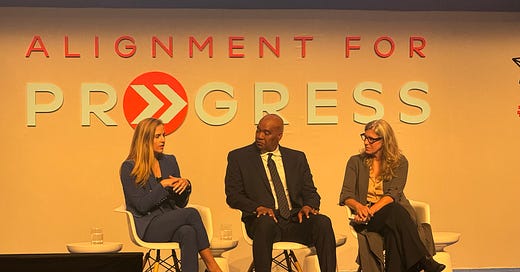From Eisenhower to Kennedy: Why the fight for wellbeing is still uncomfortable
Stigma has eased around individual mental health, but society still struggles to name the systemic drivers of our pain.
The John F. Kennedy Center for the Performing Arts is the kind of place you dress up to visit. The red-carpeted, marble-walled landmark is known for its elegance and formality. But last week, a former U.S. congressman shed the pretense to talk about his raw, chaotic journey with bipolar disorder and addiction. He told a story about visiting the emergency room to get stitches for his hand. A recovering addict but not asked about it by the nurse, he volunteered that he’s “allergic” to opioid painkillers. When she inquired about his symptoms, he replied, “I might break out in handcuffs.”
The messiness of Patrick J. Kennedy’s past might have seemed out of place at the Kennedy Center if not for his family name. Yet his culture-shifting candor and 13 years of continuous sobriety are what embody the vision of past presidents who set the stage for him even before he was born.
In 1953, President Dwight D. Eisenhower declared mental illness as one of America’s “most difficult and costly problems,” establishing National Mental Health Week to recognize it. Five years later, he signed the National Cultural Center Act to build an “artistic Mecca” in the nation’s capital. It ultimately became the Kennedy Center, renamed as a “living memorial” to the young president following his November 1963 assassination. A month before his murder, the last bill JFK ever signed was the Community Mental Health Act. He said people with mental illness and intellectual disabilities “need no longer be alien to our affections or beyond the help of our communities.”
More than a half century later, individuals don’t face as much stigma for talking about mental illness, thanks to the personal stories of people like JFK’s nephew, Patrick, Olympian Simone Biles, entrepreneur Andy Dunn and actors Constance Wu and Mark Duplass to name a few. But the United States as a political and social system still inherently treats millions of people like it is their fault for getting sick.
Keep reading with a 7-day free trial
Subscribe to Invisible Threads to keep reading this post and get 7 days of free access to the full post archives.



